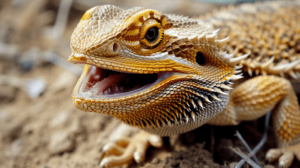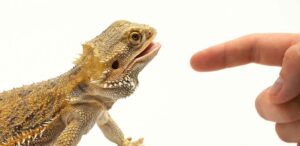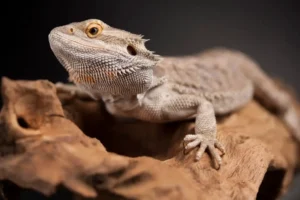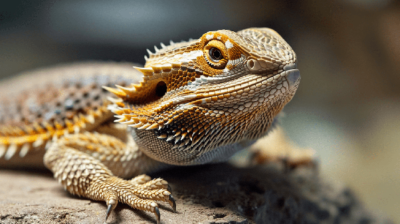So, you’re curious about bearded dragons, huh? Well, you’ve landed on the right page. Today, we’re diving into the intriguing world of these scaly companions to answer a burning question: Are bearded dragons dangerous?
It’s a query that often pops up for those considering these reptiles as pets or even for those who simply want to understand more about these fascinating creatures. So, buckle up, because we’re about to explore the ins and outs of bearded dragon behavior and whether these seemingly laid-back lizards pose any threats.
Are bearded dragons dangerous?

Bearded dragons (Pogona species) are generally not considered dangerous to humans. They are popular reptile pets and are known for their calm and docile nature. However, like any animal, they can exhibit defensive behaviors if they feel threatened or cornered. These behaviors may include hissing, puffing up their bodies, or even attempting to bite. While their bites are not typically severe, they can still cause some discomfort.
It’s important to handle bearded dragons gently and with care to avoid stressing them, and it’s advisable to wash your hands before and after handling them to prevent the potential transmission of any bacteria.
While bearded dragons are generally safe to keep as pets, it’s crucial to provide them with the proper habitat, diet, and care to ensure their well-being. Additionally, it’s essential to be aware that reptiles can carry Salmonella bacteria, so practicing good hygiene is important when interacting with them.
If you’re considering getting a bearded dragon or any other reptile as a pet, it’s recommended to do thorough research on their care requirements and behavior to ensure a positive and safe experience for both the owner and the animal.
Common Perceptions on Bearded Dragons’ Danger
Bearded dragons are generally perceived as safe and gentle reptile pets. However, some common misconceptions or concerns may contribute to the perception of danger. Here are a few points to consider:
- Bite Risk: While bearded dragons are not known for aggressive behavior, they may bite if they feel threatened or stressed. However, their bites are typically not severe, and the primary concern is more about surprise or discomfort rather than actual danger.
- Salmonella Risk: Like many reptiles, bearded dragons can carry Salmonella bacteria. This can pose a risk to humans, especially if proper hygiene practices are not followed. Washing hands thoroughly after handling a bearded dragon or cleaning their habitat is crucial to minimize the risk of infection.
- Defensive Behaviors: When feeling threatened, bearded dragons may exhibit defensive behaviors such as hissing, puffing up, or displaying their beard (flaring out the skin under their throat). These behaviors are more about self-defense than aggression.
- Size and Strength: Bearded dragons are relatively small and not powerful, which makes them less likely to cause harm compared to larger reptiles. Their claws are not particularly sharp, and they lack the physical strength to pose a significant threat.
- Taming and Socialization: Proper handling, regular interaction, and gentle taming efforts can contribute to a bearded dragon’s calm demeanor. Well-socialized bearded dragons are less likely to exhibit defensive behaviors.
It’s important for potential owners and those interacting with bearded dragons to be aware of their specific needs, behavior, and potential risks. With proper care and understanding, bearded dragons are considered one of the more docile and manageable reptile species, making them suitable pets for individuals with the time and commitment to meet their requirements.
Potential Risks and Concerns

While bearded dragons are generally considered safe pets, there are some potential risks and concerns that owners should be aware of:
- Salmonella: Bearded dragons, like many reptiles, can carry Salmonella bacteria. Salmonella can cause illness in humans, leading to symptoms such as diarrhea, fever, and abdominal cramps. Practicing good hygiene, such as washing hands thoroughly after handling the dragon or cleaning their habitat, is crucial to minimize the risk of Salmonella transmission.
- Bites and Scratches: Although bearded dragons are not known for aggressive behavior, they may bite or scratch if they feel threatened or stressed. While their bites are usually not severe, scratches or bites can still lead to minor injuries or infections if not properly cared for.
- Respiratory Infections: Bearded dragons can be susceptible to respiratory infections, especially if their habitat is not properly maintained. Poor temperature regulation, inadequate humidity levels, or exposure to drafts can contribute to respiratory issues. Regular veterinary check-ups and proper habitat care can help prevent such problems.
- Metabolic Bone Disease (MBD): Inadequate nutrition, particularly a lack of calcium and vitamin D3, can lead to metabolic bone disease in bearded dragons. MBD can cause deformities and weakness in the bones. Providing a well-balanced diet with proper supplementation and exposure to UVB light is crucial for preventing this condition.
- Impaction: Bearded dragons may ingest substrate or foreign objects, leading to impaction. This occurs when the digestive tract becomes blocked, potentially causing serious health issues. Using a substrate that minimizes the risk of impaction, providing proper heating for digestion, and monitoring the dragon’s behavior can help prevent this problem.
- Stress-Related Issues: Bearded dragons can experience stress due to factors such as inadequate habitat conditions, improper handling, or changes in their environment. Prolonged stress can weaken their immune system and make them more susceptible to illness.
To mitigate these risks, potential bearded dragon owners should thoroughly research their care requirements, provide an appropriate habitat, and seek regular veterinary care. Proper husbandry, nutrition, and hygiene practices are essential for ensuring the health and well-being of bearded dragons in captivity.
Benefits of Bearded Dragons as Pets
Bearded dragons make popular pets for several reasons, and their popularity has grown over the years. Here are some benefits of keeping bearded dragons as pets:
- Docile Nature: Bearded dragons are known for their calm and gentle temperament. They are generally easy to handle and can tolerate human interaction well, making them suitable for beginners and families.
- Manageable Size: Bearded dragons are medium-sized reptiles, making them more manageable in terms of space requirements compared to larger reptiles. Their size makes them suitable for a range of living situations, including apartments and smaller homes.
- Low Maintenance: While all pets require care, bearded dragons are considered relatively low-maintenance compared to some other reptiles. They don’t have extremely complex dietary needs, and their habitat setup is less demanding than that of some other reptiles.
- Lack of Aggression: Bearded dragons are not aggressive by nature. While they may display defensive behaviors if they feel threatened, they are not prone to biting or attacking their owners.
- Long Lifespan: With proper care, bearded dragons can live for a relatively long time, often reaching up to 10-15 years or even longer. This allows for a long-term companionship with a pet.
- Educational Opportunities: Keeping a bearded dragon as a pet can provide educational opportunities for both children and adults. Learning about their natural behaviors, habitat requirements, and dietary needs can be a fascinating and educational experience.
- Entertaining Behaviors: Bearded dragons exhibit interesting behaviors, such as head bobbing, arm waving, and “bearding” (puffing out the skin under their throat). Their activities and interactions can be entertaining for observers.
- Wide Availability: Bearded dragons are readily available through reputable breeders and pet stores. This availability provides potential owners with various options when choosing a pet.
- Variety of Colors and Morphs: Bearded dragons come in various colors and morphs, allowing owners to choose a pet that suits their preferences. The variety in appearance adds to the appeal of keeping these reptiles as pets.
- Therapeutic Value: Many pet owners find joy and relaxation in caring for their bearded dragons. The routine of feeding, cleaning, and interacting with a pet can have therapeutic benefits, contributing to reduced stress and improved well-being.
While bearded dragons have their specific care requirements, their positive attributes, gentle nature, and ease of interaction make them a popular choice among reptile enthusiasts and pet owners alike.

Proper Handling Techniques
Proper handling of a bearded dragon is essential for the well-being of both the pet and the owner. Here are some tips for handling bearded dragons:
- Wash Your Hands: Before handling your bearded dragon, wash your hands thoroughly with soap and water. This helps prevent the transfer of bacteria between you and the reptile.
- Approach Calmly: When approaching your bearded dragon, do so slowly and calmly. Abrupt movements or loud noises can stress them.
- Support Their Body: When picking up a bearded dragon, support its body properly. Place one hand under its body, supporting the chest and abdomen, while allowing the legs to rest on your hand. Use the other hand to support the hindquarters and tail.
- Avoid Grabbing the Tail: Bearded dragons can drop their tails as a defense mechanism, a phenomenon known as autotomy. While the tail will eventually grow back, it’s best to avoid grabbing or pulling on it.
- Allow Exploration: Once in your hands, allow the bearded dragon to move around and explore. This helps them become accustomed to being handled and builds trust.
- Be Gentle: Handle your bearded dragon gently to avoid stressing it. Avoid squeezing or gripping too tightly.
- Watch for Signs of Discomfort: Pay attention to your bearded dragon’s behavior. If it shows signs of stress, such as hissing, puffing up, or attempting to escape, it’s best to put it back in its enclosure.
- Limit Handling Time: Especially for younger or newly acquired bearded dragons, limit handling sessions to short durations at first. Gradually increase the time as the dragon becomes more accustomed to being handled.
- Handle Regularly: Regular handling helps your bearded dragon become more comfortable with human interaction. However, respect their need for rest and avoid excessive handling, particularly during shedding or after a stressful event.
- Be Mindful of Temperature: Bearded dragons are ectothermic, meaning they rely on external sources to regulate their body temperature. Ensure your hands are warm before handling them, and avoid exposing them to extreme temperature changes.
- Avoid Disturbing During Sleep: Bearded dragons are most active during the day, and they need a proper sleep cycle. Avoid waking them up during their sleeping hours.
Remember that each bearded dragon is an individual, and their comfort levels with handling may vary. It’s crucial to be patient, observe their cues, and gradually build a positive association with handling through gentle and positive experiences.

